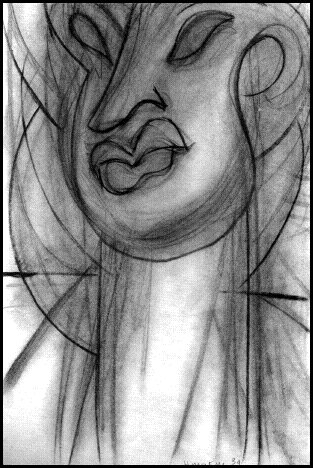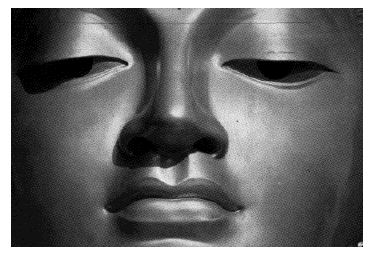Anne Donovaan
(Carroll & Graf)

- They were sittin cross-legged on the flair in fronty the coffin and they were singin. Ah suppose you would cry it singin but it was a funny kind of wailin singin. Ah'd never heard anythin like it though it was a bit like the Gaelic stuff you get then the Mod's on the TV. They had their eyes shut and it was as if they were in another world. Ah was aboot tae tell them tae stop, tae get oot afore there was any mair trouble, but somehow ah couldnae. Ah just stood there listeninn. Don't know whit they were singin, but it seemed tae haud me in a kind of spell.
This strange lovely language adds another level to what is already an interesting piece of writing. All this stuff is going on: Jimmy getting enmeshed in Buddhism, driving everyone mad; Anne Marie filling her days as kids will with school and music and a tape competition for the BBC; Mum taking this Buddha stuff for as long as she can, then going out to glom onto young David who brings her body, hungry from too many months of enforced celibacy, back to life:
All the time we were daein it ah felt as if as was split in two, as if part of me was inside ma body, feelin, and another part of me was somewhere up on the ceilin, watchin ... And it was like ridin; the rhythm was perfect, like these guys that ride waves on surfboards, hittin just the right spot.
Those speaking the language are the main characters in the Buddha Da. Others --- teachers, doctors, lawyers --- communicate with King's English, and soon, for the reader, the King's English is not enough. Anne Donovan is probably a poet pretending to be a novelist. Leastwise, she got me caught in her poetry, so that when those teachers and doctors and lawyers start in talking English, I worry that they don't have the poetry. You try writing a story about a mother and her daughter buying blouses at the Gap and make it sound like pure verse out of Bobby Burns:
Ah pulled the blue wan over ma heid and the two ae us are stood there and she was nearly as tall as me. She's that like Jimmy wi her fair hair and her eyes are exactly like his. And ah don't know if it was seein her all grown up like that of if it was no bein able tae see anythin of masel in her, but all of a sudden ah felt as if ah was gonnae greet. Ah turnt ma heid away and started tae pull aff the top, tryin tae hide ma tears but Annne Marie seen them.
"Mammy, are you OK?"
"Ah'm fine, hen."
This occurs on page 177, and if you have been minding your P's and Q's, you'd know by this point that "ae" is "of," "mase" means "myself," "hen" is a word of affection, and "gonnae greet" is "going to cry."
If this were just a piece of fiction in funny language, there wouldn't be anything to write home about, would there? But by my troth, Donovan knows how to construct a story, get us in to it so we love (and sometimes hate) these Glaswegians, get it so that their problems become our problems. I am reading this and thinking what it must have been like reading Dickens when he was coming out in the weeklies so that you had to wait seven days before you could see how he was going to resolve Pip's dilemma, or get another funny story out of the Pickwickians.
It isn't easy. While reading Buddha Da, I did, after all, have to do other things with my life, like breathe, eat, and sleep. Donovan knows how to construct a world filled with people from our neighborhood, funny new people we come to know ... and it almost takes away the desire to do anything else rather than go along with them. This is Anne Marie as she is listening to the lamas:
Ah love singing and maist of the time ah just dae it, never really think aboot it, but sometimes ah feel as if ma voice is comin fae somewhere else, that it's no me singing. Ah mind wan time when ah was rehearsin for the concert and it wis just me and the music teacher in the room. Ah shut ma eyes and it was like ma whole body was vibratin, like ah was a musical instrument and somebody was playin me. As could hear ma voice fae a great distance. When ah finished there was silence in the room. Ma teacher never made any comment, just sat. And listenin tae the lamas ah felt the same way. As thought they were musical instruments and the music was comin through them. And the sounds they made, that at first seemed harsh and discordant tae me, had become the maist beautiful sounds ah'd ever heard. Ah sat there and closed ma eyes.
 The author not only knows her language, not only knows love, not only loves her characters --- but, as all good authors writing about Eastern religion must --- she knows her Buddhism, knows how to place it in the context of a normal family, one that is practically destroyed by the supposedly benign world of Tibetan masters.
The author not only knows her language, not only knows love, not only loves her characters --- but, as all good authors writing about Eastern religion must --- she knows her Buddhism, knows how to place it in the context of a normal family, one that is practically destroyed by the supposedly benign world of Tibetan masters.
Thus, Buddhism becomes a counterpoint to the story of Liz and Anna Marie and Jimmy, as fine as counterpoint in a Bach cantata --- the bass line going one way, the tenor another, the alto a third: all put together in a musical whole that can make one shiver with the glory of it.
A couple of times in the past we've bemoaned the fact that we don't have stars hanging around RALPH so we can pin them on a worthy writer (except for the single stars that appear on our General Index page). Buddha Da would probably garner the full monty. Big ones. Of gold. Shimmering there, right at the top, right where they belong.